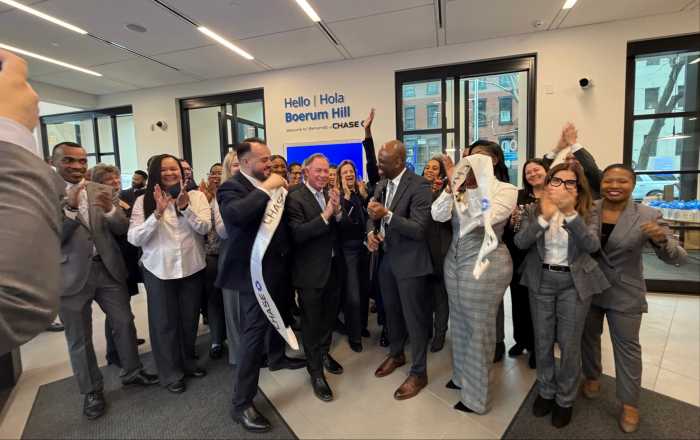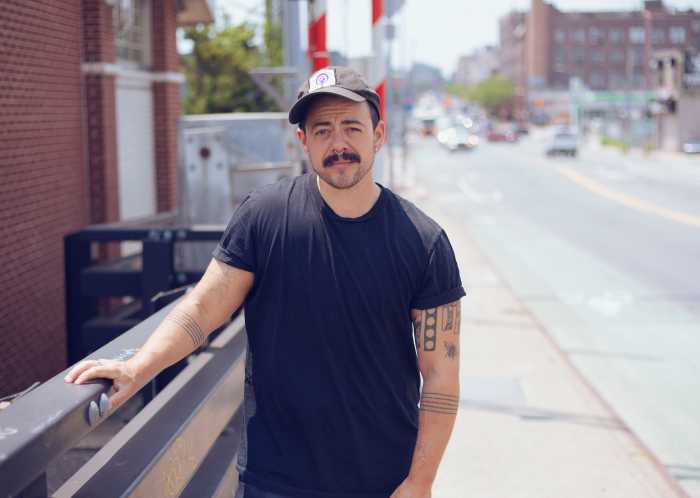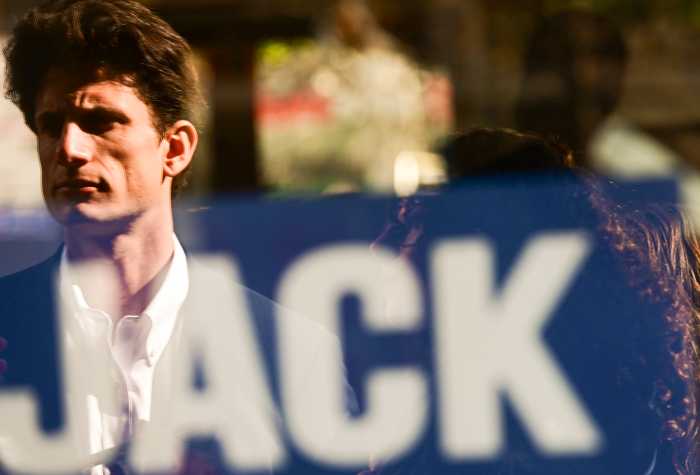The City Council voted 50-1 Wednesday in favor of zoning changes that
would allow Swedish home furnishings giant Ikea to build a megastore on
the Red Hook waterfront. Only East New York Councilman Charles Barron
voted against the contentious plan.
The measure is expected to be signed into law this week — unless,
that is, Mayor Michael Bloomberg decides to trade his Upper East Side
townhouse for a Red Hook walk-up.
Talking to reporters a day after the council’s land use committee
approved the Ikea project, Bloomberg said candidly, “I happen to
be a supporter of it. But I think if I lived there, I don’t know
whether I would be, quite honestly.”
Asked whether Bloomberg was referring to the traffic and noise the store
is expected to bring to the streets of Red Hook, a mayoral spokesman said,
“I think it’s clear what he meant.”
Opponents of the Ikea plan for Red Hook say it will choke the relatively
quiet community with traffic and open the door for more big-box store
development on the Brooklyn waterfront.
Houses hail project’s OK
But the council’s vote was hailed by proponents of the project, who
include many residents of the Red Hook Houses, a public housing complex
that makes up 75 percent of the neighborhood’s population, many of
whom argued the need for jobs.
“The hard part is over with,” said Ray Hall, founder of Red
Hook Rise, a youth empowerment organization in the area that has advocated
for job training programs from Ikea.
“It is a God blessing for this community and for the surrounding
businesses,” he said. “The little local restaurants that are
struggling now, they should do well with this big business in the neighborhood.”
Ikea is proposing to build a $70 million, 346,000-square-foot store on
the former shipyard, between Dwight and Columbia streets along the Erie
Basin. The company would also build 1,400 parking spaces and Ikea has
proposed running a free ferry service to the store from downtown Manhattan.
The project would also include more than 70,000 square feet of adjacent
restaurant and retail space and a mile-long public esplanade.
Arguments by opponents of the project suggested that the waterfront space
would be better suited to building more small businesses that could employ
an equal amount of local residents and take advantage of the views of
Manhattan.
‘Monopoly capitalism’
“This was monopoly capitalism at its worst,” said the lone council
dissenter Barron.
“There was no competitive bidding, no competing deals for that spot
were considered,” he said.
“We should offer the people of New York more from the developer.”
Barron said the role of the council should be building more alliances
between large scale developers, businesses and communities.
“Since they love us so much, and always want to come in our neighborhoods,
why don’t they involve us in profit sharing?” Barron asked.
But Red Hook Councilwoman Sara Gonzalez, who helped broker the deal with
Ikea — which has promised to accept local employee applications two
weeks earlier than others alter roadways to help mitigate the impact of
traffic, and complete follow-up studies on traffic impacts — was
not bothered by Barron’s anti-Ikea vote.
“She was quite pleased at the vote,” said Felix Palacio, a Gonzalez
spokesman. Another aide to Gonzalez, Lois Marbach, said that Ikea had
committed to her, in writing, to hire for at least 50 management jobs
locally, “which is very important because we didn’t want to
do just entry-level,” said Marbach, who also described the plans
as a “work in progress.”
“There is still time to meet with [Ikea] and negotiate what’s
best for the community,” she said, but mentioned that the promise
of 600 jobs took precedence for Gonzalez.
“And because it has now been voted on by the City Council, they will
have oversight,” she said, in ensuring promises are kept by Ikea.
Barron stands by himself
Up until the Oct. 13 vote, Queens Councilman Tony Avella, who chairs the
zoning and franchises subcommittee and described the superstore as “a
great project” thought Barron would vote in favor of it, presenting
the appearance of unanimous support among the council.
“I had a talk with him after last week’s hearing, and he indicated
to me that he was going to vote in favor of it,” Avella said in the
council chambers just prior to the vote, referring to Barron’s abstaining
from the land use committee vote on Oct. 6.
But Barron, sitting only paces away, shook his head.
“I’m voting no,” he said. “I already told [Gonzalez]
and just told [Land Use Chairwoman] Councilwoman Melinda Katz. I commend
my colleagues for all the work they’ve done and I’m happy for
them, but I’d like to vote no on a statement of principle.”
Barron repeated a point about profit sharing, or entitling the community
to 1 or 2 percent of profits to go towards a local development fund, but
Marbach said Gonzalez thought those requests were “unreasonable.”
Ursula Hahn, a resident of the Concord Village co-op in Downtown Brooklyn,
didn’t think Barron was so much unreasonable as insincere.
“I think to take such a populist stance for someone so removed from
the area rings a little hollow,” she said.
But Lou Sones, an ardent Ikea opponent from Red Hook, felt much differently.
“The guy has balls,” Sones said.
‘Fight not over’
John McGettrick, a Red Hook resident opposed to the Ikea plan, said the
council vote would not discourage those against the plan.
“Obviously, we’ll have to continue our opposition,” McGettrick
said, adding that they would bring their opposition to city and state
administrative panels and, if necessary, to court.
“We will seek legal measures to correct what is essentially an environmental
disaster for not only Red Hook but for adjacent areas as well,” he
vowed.
McGettrick mentioned his irritation that “highly paid lobbyists have
totally distorted the true appraisal of the facts,” saying that despite
the fact that Ikea officials have refused to guarantee jobs to Red Hook
residents, their public relations consultant, Joni Yoswein, had done a
good job with giving the impression they had.
“The only guarantees that were given were of pollution, destruction
of numerous historic structures, guarantees of increase of accidents and
guarantees of problems for our small businesses and manufacturers throughout
the area that attempt to compete against this tax-subsidized entity,”
he said.
Meanwhile, Ikea co-sponsored a luncheon for members of the Brooklyn Chamber
of Commerce Wednesday afternoon. Ikea, although more than a year away
from opening, is considered a “Chamber Champion,” a designation
used by the organization to denote major contributors.
Yoswein, whose firm represents both the Brooklyn Chamber and Ikea, was
congratulated by chamber president Kenneth Adams at the luncheon.
“Everybody put your hands together for Ikea!” Adams said at
the luncheon. “Joni Yoswein is here with us today — she is her
own company!” He then called Yoswein a “champion of Brooklyn.”
“I’m sure that some of the same people who are pushing Ikea,
would push the idea that Bush won all three of the debates,” said
McGettrick, who characterized the legal basis for a lawsuit challenging
the Ikea plan as environmental in nature.
“This will continue,” he vowed. “We have simply entered
into another phase.”






















